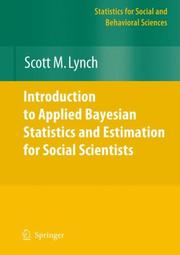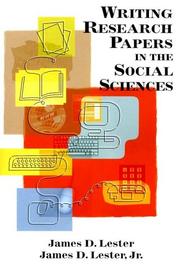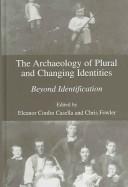| Listing 1 - 10 of 52 | << page >> |
Sort by
|
Book
ISBN: 9780387362182 Year: 2006 Publisher: Boston MA Springer US
Abstract | Keywords | Export | Availability | Bookmark
 Loading...
Loading...Choose an application
- Reference Manager
- EndNote
- RefWorks (Direct export to RefWorks)
During the past three decades, feminist scholars in almost all social and behavioral sciences, as well as the humanities, have successfully demonstrated the ubiquity and omnirelevance of gender as a socio-cultural construction in virtually all human collectives, past and present. Gender shapes and is shaped in all arenas of social life, from the most mundane practices of everyday life to those of the most powerful corporate actors. In this seminal work, the contributors focus on sociological theories and research concerning gender, which are discussed across the full array of social processes, structures and institutions. In each chapter, focus is placed on gender rather than on women alone, and copious cross-national and historical material is utilized in addition to an in-depth focus on contemporary North America. Sections include: I: Basic Issues II: Macrostructures and Processes III: Microstructures and Processes IV: Institutions Each of these viewpoints survey the field in a critical manner, evaluating theoretical models in light of the best available empirical evidence. Distinctively sociological approaches are highlighted by means of explicit comparison to perspectives characterizing related disciplines such as psychology, psychiatry, and anthropology. This volume seeks to record where the field has been, to identify its current location and to plot its course for the future.
Social sciences. --- Consciousness. --- Apperception --- Mind and body --- Perception --- Philosophy --- Psychology --- Spirit --- Self --- Behavioral sciences --- Human sciences --- Sciences, Social --- Social science --- Social studies --- Civilization

ISBN: 9780387712642 038771264X 9780387712659 1441924345 9786610944422 1280944420 0387712658 Year: 2007 Publisher: New York, N.Y. Springer
Abstract | Keywords | Export | Availability | Bookmark
 Loading...
Loading...Choose an application
- Reference Manager
- EndNote
- RefWorks (Direct export to RefWorks)
Introduction to Applied Bayesian Statistics and Estimation for Social Scientists covers the complete process of Bayesian statistical analysis in great detail from the development of a model through the process of making statistical inference. The key feature of this book is that it covers models that are most commonly used in social science research, including the linear regression model, generalized linear models, hierarchical models, and multivariate regression models, and it thoroughly develops each real-data example in painstaking detail. The first part of the book provides a detailed introduction to mathematical statistics and the Bayesian approach to statistics, as well as a thorough explanation of the rationale for using simulation methods to construct summaries of posterior distributions. Markov chain Monte Carlo (MCMC) methods—including the Gibbs sampler and the Metropolis-Hastings algorithm—are then introduced as general methods for simulating samples from distributions. Extensive discussion of programming MCMC algorithms, monitoring their performance, and improving them is provided before turning to the larger examples involving real social science models and data. Scott M. Lynch is an associate professor in the Department of Sociology and Office of Population Research at Princeton University. His substantive research interests are in changes in racial and socioeconomic inequalities in health and mortality across age and time. His methodological interests are in the use of Bayesian stastistics in sociology and demography generally and in multistate life table methodology specifically.
Mathematical statistics --- Social sciences --- Bayesian statistical decision theory --- Sciences sociales --- Statistique bayésienne --- Statistical methods --- Méthodes statistiques --- Bayesian statistical decision theory. --- Social sciences -- Statistical methods. --- Social sciences. --- Social Sciences --- Statistics - General --- Social Sciences - General --- Statistical methods. --- Bayes' solution --- Bayesian analysis --- Statistics. --- Demography. --- Social Sciences. --- Methodology of the Social Sciences. --- Statistics for Social Science, Behavorial Science, Education, Public Policy, and Law. --- Statistics for Social Science, Behavioral Science, Education, Public Policy, and Law. --- Historical demography --- Population --- Vital statistics --- Statistical analysis --- Statistical data --- Statistical science --- Mathematics --- Econometrics --- Behavioral sciences --- Human sciences --- Sciences, Social --- Social science --- Social studies --- Civilization --- Statistical decision --- Statistics for Social Sciences, Humanities, Law. --- Methodology. --- Statistics .
Book
ISBN: 9780387776507 9780387776491 9781461413882 1461413885 0387776508 Year: 2011 Publisher: New York ; London : Springer,
Abstract | Keywords | Export | Availability | Bookmark
 Loading...
Loading...Choose an application
- Reference Manager
- EndNote
- RefWorks (Direct export to RefWorks)
The Handbook of Quantitative Criminology is designed to be the authoritative volume on methodological and statistical issues in criminology and criminal justice. At a time when this field is gaining in sophistication and dealing with ever more complex empirical problems, this volume seeks to provide readers with a clear and up to date guide to quantitative criminology. Authored by leading scholars in criminology/criminal justice, the Handbook contains 35 chapters on topics in the following key areas: (1) research design, (2) experimental methods, (3) methods for overcoming data limitations, (4) innovative descriptive methods, (5) estimation techniques for theory and policy, (6) topics in multiple regression, and (7) new directions in statistical analysis. The contributions are written to be accessible to readers with a basic background in statistics and research methods, but they also provide a cutting edge view of statistical and methodological problems and questions. This book will be the go-to book for new and advanced methods in the field that will provide overviews of the key issues, with examples and figures as warranted, for students, faculty, and researchers alike.
Social Sciences. --- Criminology & Criminal Justice. --- Statistics for Social Science, Behavorial Science, Education, Public Policy, and Law. --- Methodology of the Social Sciences. --- Social sciences. --- Statistics. --- Criminology. --- Social sciences --- Sciences sociales --- Statistique --- Criminologie --- Methodology. --- Méthodologie --- Criminal statistics. --- Criminology --- Research --- Statistiques criminelles --- Recherche
Book
ISSN: 17685656 ISBN: 9782817801575 9782817801568 2817801563 Year: 2010 Publisher: Paris: Springer,
Abstract | Keywords | Export | Availability | Bookmark
 Loading...
Loading...Choose an application
- Reference Manager
- EndNote
- RefWorks (Direct export to RefWorks)
Cet ouvrage expose les fondements théoriques des méthodes classiques de la statistique (estimation et tests) ainsi que des approches introduites plus récemment. Les premiers chapitres sont consacrés aux notions de la théorie des probabilités, nécessaires à la statistique. Puis sont développés les tests et méthodes d'estimation dans les situations paramétriques et non paramétriques. Les modèles de base de la régression sont traités en fin d'ouvrage. Chaque chapitre est accompagné d'exemples concrets, mais aussi d'exercices - plus de 150 au total - dont les corrigés ont été intégrés dans cette deuxième édition. La présentation témoigne d'un réel souci pédagogique de l'auteur qui bénéficie d'une vaste expérience d'enseignement auprès de publics très variés. Les résultats exposés sont, autant que possible, replacés dans la perspective de leur utilité pratique. Le niveau mathématique requis rend ce livre accessible aux étudiants de premier cycle universitaire et aux chercheurs dans les divers domaines des sciences appliquées. Il sera donc utile aux étudiants devant aborder les aspects théoriques de la statistique ou aux utilisateurs, pour les assurer du choix judicieux des méthodes qu'ils emploient.
Statistics. --- Statistical Theory and Methods. --- Statistics for Life Sciences, Medicine, Health Sciences. --- Statistics for Social Science, Behavorial Science, Education, Public Policy, and Law. --- Mathematical statistics. --- Statistique --- Statistique mathématique --- Statistics as Topic
Book
ISBN: 9783642117602 9783642117596 3642117597 Year: 2010 Publisher: Berlin: Springer,
Abstract | Keywords | Export | Availability | Bookmark
 Loading...
Loading...Choose an application
- Reference Manager
- EndNote
- RefWorks (Direct export to RefWorks)
This book combines longitudinal research and latent variable research, i.e. it explains how longitudinal studies with objectives formulated in terms of latent variables should be carried out, with an emphasis on detailing how the methods are applied. Because longitudinal research with latent variables currently utilizes different approaches with different histories, different types of research questions, and different computer programs to perform the analysis, the book is divided into nine chapters. Starting from (a) some background information about the specific approach (a short history and the main publications), each chapter then (b) describes the type of research questions the approach is able to answer, (c) provides statistical and mathematical explanations of the models used in the data analysis, (d) discusses the input and output of the programs used, and (e) provides one or more examples with typical data sets, allowing the readers to apply the programs themselves.
Statistics. --- Statistical Theory and Methods. --- Mathematical statistics. --- Statistique --- Statistique mathématique --- Social sciences --- Research --- #SBIB:303H520 --- Methoden sociale wetenschappen: techniek van de analyse, algemeen --- Social science research --- Social sciences - Research
Book
ISBN: 9781446275139 9781446275146 Year: 2015 Publisher: Los Angeles, Calif. Sage
Abstract | Keywords | Export | Availability | Bookmark
 Loading...
Loading...Choose an application
- Reference Manager
- EndNote
- RefWorks (Direct export to RefWorks)
Design is everywhere: it influences how we live, what we wear, how we communicate, what we buy, and how we behave. In order for designers to design for the real world, defining strategies rather than just implementing them, they need to learn how to understand and solve complex, intricate and often unexpected problems. This book is a guide to this new creative process. With this book in hand, students of design will: understand and apply the vocabulary and strategies of research methods, learn how to adapt themselves to unfamiliar situations, develop techniques for collaborating with non-designers, find and use facts from diverse sources in order to prove or disprove their ideas, make informed decisions in a systematic and insightful way, use research tools to find new and unexpected design solutions. Research for Designers is an essential toolkit for a design education and a must-have for every design student who is getting ready to tackle their own research.
Production management --- Building design --- Architecture --- Industrial design --- Social sciences --- Design, Industrial --- Research --- Methodology. --- onderzoek --- Design --- Mechanical drawing --- New products --- Wetenschappelijk onderzoek --- Ontwerpen --- Behavioral sciences --- Human sciences --- Sciences, Social --- Social science --- Social studies --- Civilization --- Research&delete& --- Methodology
Book
ISBN: 9783531156026 9783531909189 3531156020 3531199617 3531909185 Year: 2008 Publisher: Wiesbaden VS-Verlag
Abstract | Keywords | Export | Availability | Bookmark
 Loading...
Loading...Choose an application
- Reference Manager
- EndNote
- RefWorks (Direct export to RefWorks)
This volume is a major contribution to the trans-national debate on public relations research and communication management. It presents dominant concepts and findings from the scientific community in Germany in English language. At the same time, the compilation contains a selection of the most influential and relevant approaches from European and international researchers. Editors and contributors are renowned academics from all over the world. This books honours Guenter Bentele, one of the international spearheads of public relations research, and gives academics, students and communication managers a focussed insight into the field.
PR (public relations) --- Advertising. Public relations --- Social Sciences, general. --- Sociology. --- Sociologie --- Public relations -- Research. --- Public relations. --- Research. --- Social Sciences --- Sociology --- Public relations --- Social theory --- Business --- Industries --- PR (Public relations) --- Social sciences. --- Communication. --- Social Sciences. --- Communication Studies. --- Advertising --- Industrial publicity --- Mass media and business --- Propaganda --- Publicity --- Social sciences --- Communication, Primitive --- Mass communication --- Behavioral sciences --- Human sciences --- Sciences, Social --- Social science --- Social studies --- Civilization
Book
ISBN: 9783835055285 3835070118 9783835070110 3835055283 Year: 2008 Publisher: Wiesbaden : VS Verlag fur Sozialwissenschaften / GWV Fachverlage GmbH,
Abstract | Keywords | Export | Availability | Bookmark
 Loading...
Loading...Choose an application
- Reference Manager
- EndNote
- RefWorks (Direct export to RefWorks)
Powerfully driven by the work practices of consulting firms, the presentation software Microsoft PowerPoint is increasingly used on all levels of business and educational communication. Nevertheless, slideware ranks among the least explored media in communication studies. This study investigates the role of PowerPoint in organizational communication, particularly in terms of a functional dilemma between its application for documentation as opposed to presentation purposes. The theoretical part of the analysis combines insights from both organizational communication studies (J. R. Taylor et al.) and social systems theory (N. Luhmann et al.). The empirical analysis shows that PowerPoint documents created for cross-project learning purposes contribute to an invisibilization rather than a visibilization of decision processes and their contingency. In the light of these results, existing efforts to promote knowledge management based on the learning-from-mistakes principle need to be reconsidered with respect to their realization in communicative practice.
Social Sciences, general. --- Sociology. --- Sociologie --- Knowledge management. --- Microsoft PowerPoint (Computer file). --- Presentation graphics software. --- Management --- Sociology & Social History --- Business & Economics --- Social Sciences --- Social Change --- Management Styles & Communication --- Project management. --- Industrial project management --- Social theory --- Social sciences. --- Communication. --- Social Sciences. --- Communication Studies. --- Social sciences --- Communication, Primitive --- Mass communication --- Sociology --- Behavioral sciences --- Human sciences --- Sciences, Social --- Social science --- Social studies --- Civilization

ISBN: 032126763X Year: 2006 Publisher: New York Longman
Abstract | Keywords | Export | Availability | Bookmark
 Loading...
Loading...Choose an application
- Reference Manager
- EndNote
- RefWorks (Direct export to RefWorks)
Engelse taal --- Sociale wetenschappen --- Wetenschappelijk onderzoek --- #KVHB:Sociale wetenschappen --- #KVHB:Wetenschappelijk onderzoek --- #KVHB:Rapporteren --- #KVHB:Schrijfvaardigheid --- #SBIB:303H0 --- Methoden in de sociale wetenschappen: algemeen --- English language --- Report writing --- Social sciences --- Behavioral sciences --- Human sciences --- Sciences, Social --- Social science --- Social studies --- Civilization --- Rhetoric --- Authorship --- Research --- Methodology --- Germanic languages

ISBN: 1280233982 9786610233984 0306486954 0306486938 0306486946 9780306486937 9780306486944 9780306486951 Year: 2004 Publisher: Paris ; Berlin ; Heidelberg ; ...[et al.] Springer
Abstract | Keywords | Export | Availability | Bookmark
 Loading...
Loading...Choose an application
- Reference Manager
- EndNote
- RefWorks (Direct export to RefWorks)
"Questions of identity have plagued the field of archaeology since its earliest antiquarian origins. The ability to discover, recover, or uncover a past culture required the assumption of a direct relationship between its material remains and social identity. Artifacts and architectural features alike have been conceptualized as "signatures" or "representations" of specific cultures – from the "Beaker People" of the European Neolithic to the "Georgian" world view of eighteenth century Colonial America. Thus, archaeologists have employed an explicitly material focus in their examinations of identity. Yet, as people move through life they continually shift affiliation from one position to another, dependent on the wider contexts of their interactions. Different forms of material culture may be employed as affiliations shift, and the connotations of any given set of artifacts may change. In this volume the authors explore these overlapping spheres of social affiliation. Social actors belong to multiple identity groups at any moment in their life. It is possible to deploy one or many potential labels in describing the identities of such an actor. Two main axes exist upon which we can plot experiences of social belonging -- the synchronic and the diachronic. Identities can be understood as multiple during one moment (or the extended moment of brief interaction), over the span of a lifetime, or over a specific historical trajectory." - from the Introduction The international group of contributions each illuminate how the various identifiers of race, ethnicity, sexuality, age, class, gender, personhood, health, and/or religion are part of both material expressions of social affiliations, and transient experiences of identity. The Archaeology of Plural and Changing Identities: Beyond Identification will be of great interest to archaeologists, anthropologists, historians, curators and other social scientists interested in the mutability of identification through material remains.
Archaeology and history. --- Social archaeology. --- Identity (Psychology) --- Personal identity --- Personality --- Self --- Ego (Psychology) --- Individuality --- Archaeology --- Historical archaeology --- History and archaeology --- History --- Methodology --- Anthropology/archaeometry. --- Archeologie. --- Archéologie et histoire. --- Archéologie sociale. --- Identiteit. --- Identity (psychology). --- Identité (psychologie). --- Social science --- Social sciences, general. --- Sociale identiteit. --- Archaeology. --- Anthropology. --- Human beings --- Archeology --- Anthropology --- Auxiliary sciences of history --- Antiquities --- Primitive societies --- Social sciences
| Listing 1 - 10 of 52 | << page >> |
Sort by
|

 Search
Search Feedback
Feedback About UniCat
About UniCat  Help
Help News
News